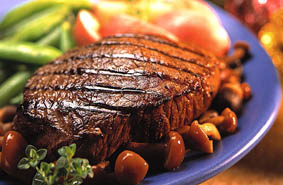Slow-grown native beef proves healthier
Native breed beef cattle, grown on biodiverse pastures produce beef with health benefits.
Finishers of traditional breeds of beef cattle who graze their stock on natural pastures could be producing some of the healthiest beef in the UK - and it could earn them a significant market share if they capitalise on the findings of a five-year trial undertaken by Bristol University completed in 2010.
The trial has shown that traditional breeds reared on pastures with a rich biodiversity of plants and grasses have lower levels of saturated fat and contain more antioxidants than beef produced by cattle reared intensively. It investigated the performance of traditional breeds reared on unimproved pastures to assess the quality of the beef produced - including taste - compared with that from intensively reared Charolais crosses.
Ian Richardson, a senior research fellow at Bristol University, said the trial found traditional breeds reared on unimproved pasture produced beef of a high nutritional value.
In the blind tasting trial involving 17 families it was found there was a clear preference for the beef produced from traditional breeds reared on biodiverse pasture compared beef from younger, continental crosses reared intensively, said Dr Richardson.
But in addition to the taste preference, the trial enabled us to assess levels of fat deposition in the traditional breeds and to investigate the type of fat produced by cattle reared under this type of system.
The trial showed that traditional breeds produced higher levels of polyunsaturated fat.
Consumers know the adverse health risks of eating saturated fat, but traditional cattle studied in the trial all put down fat depositions that were high in polyunsaturates which are actually good for human health.
The higher levels of polyunsaturated fats also increased the shelf-life of beef because of the presence of naturally occurring antioxidants which stop oxidisation. We also found this beef contained the highest levels of vitamin E compared with intensively-reared cattle.
The trial, supported by the Rare Breeds Survival Trust, Traditional Breeds Meat Marketing and Natural England, was undertaken on unimproved pastures containing 40-60 plant species compared with 14-30 species usually found in improved grazing. There were 157 cattle involved and 100 carcasses were used in the final analysis.
Beef produced on biodiverse pastures has low levels of fat because the pastures don't allow rapid growth of the cattle which leads to excessive fat deposition. The low fat content allows the long-chain omega-3 fatty acids to reach higher concentrations compared to beef produced intensively.
The contribution to eating quality was also assessed by comparing post-slaughter processing of the carcasses. Beef that was hung for 20-28 days compared with beef matured for just 10 days - and hung on-the-bone rather than aged in vacuum bags - achieved higher tasting scores for tenderness, juiciness and flavour.
Farmer reaction
Hertfordshire Abeerdeen Angus breeder Colin Howard runs 35 cows in his Chorleywood herd hopes the results of the Bristol trial will focus even more attention on the eating quality of beef produced by native breeds.
Anyone who tries Angus beef for the first time is always amazed by the taste and the texture, but it's going to have even bigger appeal to consumers if there's now proven evidence of low levels of saturated fat, says Mr. Howard.
# 3 |

